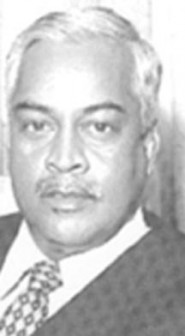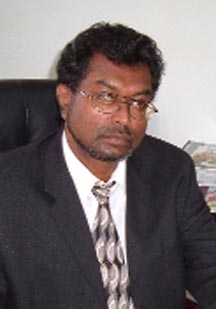Persons living on state land can no longer apply for prescriptive title, with the passage of an amendment that the government stoutly defended as necessary to protect state property while opposition parties dubbed it unconstitutional.
The Title to Land (Prescription and Limitation) (Amendment) Bill 2011 was yesterday denounced by opposition speakers as “overreaching” and in a lively debate, they pronounced it “unconstitutional” and suggested that it could be challenged in court. The amendment will become law once it is assented to by President Bharrat Jagdeo.
Attorney General Charles Ramson, however, in a scathing riposte, said that the Bill did not violate the spirit or letter of the Constitution, while adding that he was “ashamed to know that as leader of the bar, I have followers like them.”
The Bill repeals and re-enacts section 3 of the Title to Land (Prescription and Limitation) Act. Section 3 (1) of the Act substituted by Clause 2 of the Bill reiterates that in the case of private land, the law relating to title by prescription remains the same. The title may be acquired by the sole and undisturbed possession for not less than twelve years, where the possession was not taken by fraud or consent and the right of every other person to recover the land has expired or been barred.

Section 3 (2) of the Act, substituted by clause (2) of the Bill, states that State land, government land, land wholly owned by State enti3ties including companies, and corporations or in which the controlling interest is vested in the State and lands, identified by law or on a plan drawn and approved in accordance with any law, set aside for reserves cannot be acquired by prescription through adverse possession.
Clause 3 of the Bill preserves the right of persons, including the State, to the lands referred to in section 3 (2). “There shall be no prescription to those lands regardless of the length of adverse possession,” the explanatory memorandum of the Bill says.
Ramson, in presenting the Bill, said that it is not something that is being done without some depth of research and was being brought to prevent further “land-grabbing” from taking place. “There is nothing sinister about bringing this particular Bill to Parliament,” he stressed, while saying that it was a “simple” Bill. “There is no desire to deprive persons of a vested right as it stands here,” he said.
PNCR lead speaker Deborah Backer, however, had a different view. She said the PNCR holds a serious view of the Bill. After consultations with stakeholders, PNCR leader Robert Corbin wrote to the Prime Minister and Ramson requesting deferral of the Bill but the request was turned down, she said. She noted that under the current law, if someone occupies state land for over 30 years, the right of the state to the land is extinguished and the person can apply for prescriptive title. In the case of private land, the person can apply for prescriptive title after 12 years.
As it stands now, the scales are weighed in favour of the state and the amendments will have profound effects on ordinary people across the country, she said. The parliamentarian said that the effect of the Bill is to take away land from people who have had it for years and even generations.
Oppressive
Backer, an attorney, said that she cannot support the Bill because “it increases the already weighted power that the government now enjoys.” It is also “oppressive and it discriminates,” she said, pointing out that the state, “this big dragon, this big octopus… could prescribe against your land after only 12 years.”
She referred to a court case that reached to the Caribbean Court of Justice (CCJ). “It may well be that this amendment may reach to the CCJ,” she said, adding that it does not provide a level playing field. “It’s like Mount Everest with the government at the top and the hapless citizen at the bottom,” she said. She asked: What of the thousands whose rights have already accrued but cannot afford to apply for the title at this time? “This is a very, very serious matter because land is your most valuable asset,” she said, adding that citizens will “forever be banned” from applying for title. According to Backer, the amendment is retroactive although it doesn’t say so. “It increases the power of this mammoth octopus that currently presides over Guyana,” she said, while questioning whether compensation was going to be paid to persons who now apply for land that they have developed.

The issue of its constitutionality has to be looked at, she said, adding that there are grave concerns about the amendment’s constitutionality. “We are satisfied, Sir, that it is unconstitutional and if and when it is passed, Sir, the courts will have to decide,” she said. Backer said that they accept that to an extent there is a problem with regards to reserves.
Backer also slammed the “piecemeal” bringing of amendments to the National Assembly, saying that a Law Reform Commission is needed. She questioned the difficulty in looking at the Bill in totality and amending all aspects that need amending. In the very Bill, she said, an amendment could be brought to make site visits mandatory. Backer said that they have spoken to ordinary lawyers who feel that that amendment could assist land integrity in Guyana. She urged that the Bill be sent to a Select Committee for consultations.
‘A grievous issue’
But Minister of Transport and Hydraulics, Robeson Benn said that the lawlessness that has been ongoing is a “grievous issue.” He defended the amendments and pointed out that government has been developing housing schemes. “Pradoville Two,” some opposition parliamentarians heckled. Benn spoke of the problems with regards to road, river and sea defence reserves.
PNCR Parliamentarian Clarissa Riehl said that if the Bill was only to retake reserves, they would have little difficulty supporting it. But, she said, it has far reaching consequences for people who have been living on land for a very long time. Persons whose rights have been crystallised but cannot now go to court have been treated unfairly, she noted. The law may at some stage be tested in court, she warned. “This is so unfair and so unjust to the citizen…it is unfair and we cannot support it.”
In agreeing that the Bill has deep ramifications, PPP/C Parliamentarian Anil Nandlall noted that the current law confers upon a person the right to prescribe for land after 12 years if the land is private property; someone can apply for the title to the land after 30 years, if the land is state property.
The Bill in no way impacts a person right to acquire prescriptive title to private land after 12 years but rather forfeits prescription to state land, he said. According to Nandlall, in recent times, there has been an unusually high incidence of squatting on state land and he pointed to a former Prime Minister having a building on reserves along Mandela Avenue as well as another politician extending his fence at Bel Air to cover reserves. It is this type of lawlessness that the Bill seeks to combat, he said.
Nandlall said too that government has been working and from 1992 to this year, 216 squatting areas have been regularised and 18,166 persons who were occupying state lands now have title to the land. “The amendment is for the protection of the national patrimony of this country,” he said.
Pioneering
But AFC leader Khemraj Ramjattan said that the Bill will destroy the “pioneering spirit” and accused Benn and Nandlall of performing a sleight of hand as to what really is before the House. He said that the Bill is an “extraordinary sweeping” piece of legislation and giving an example, said that it will destroy a “pioneer” who would have gone to an area like within the interior, to develop the area but knowing now that the land cannot belong to them after a certain number of years, will not contemplate doing so.

Ramjattan noted that the law already says that a person cannot prescribe on reserves and the legislation is “overreaching.” He suggested that it was like “burning down the house to find the pig.” He said that the rationale for citizens prescribing against citizens must remain that same for citizens against state. He noted that there are many residents, for example in Soesdyke, who would have developed the land for years but now cannot get title to the land. In labelling the amendments unconstitutional, he said that it was giving back discretion to the state when under the presidency of the late Dr. Cheddi Jagan he was taking away the discretion from the state. “There will be deprivation of people’s rights here,” he said.
In wrapping up the debate, Ramson told the opposition members that if they felt the Bill is unconstitutional, they were at the wrong forum. He said that the amendment has nothing to do with occupation of the land and does not violate the spirit or letter of the Constitution. He said that he had received the request of the deferral at 10:30am yesterday, when he had already prepared for the session and could see no reason advanced for the deferral. The Bill is “to prevent further land-grabbing from taking place,” he said, while adding that the Act is being adjusted because of the dynamic shift in property rights. He cited the “invigilance” of those tasked with protecting state property. “There’s too must collusion in this country,” he said. The Bill does not allow for any disadvantageous action to be taken against any possessor of land, he concluded, while restating that there is nothing unconstitutional about the Bill.
The Bill says that any proceedings pending immediately before the commencement of the Act shall be continued as if the Act has not been passed.





